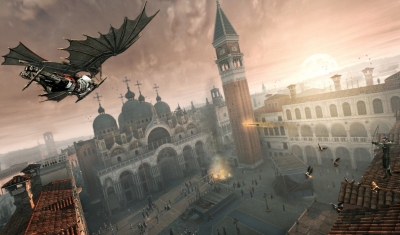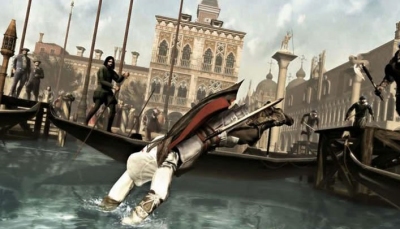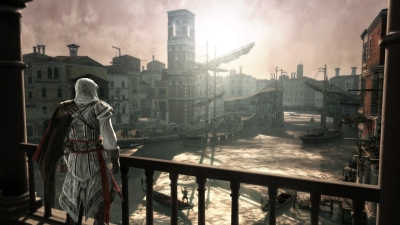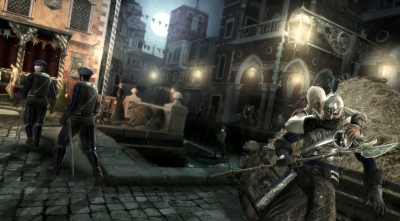 About GamePeople
About GamePeople
Subscribe to the Story Gamer column:![]() RSS or
RSS or
![]() Newsletter.
Newsletter.

Format:
360
Genre:
Adventuring
Style:
Thirdperson
Singleplayer
Buy/Support:
Support Mark, click to buy via us...
Other GamePeople columnists have reviewed this from their perspective - huh?:
Haiku Gamer (360)
Frugal Gamer (360)
Intimate Gamer (360)
Podcast (360)
Soundtrack Gamer (OST)





Further reading, films and books that create similar stories:
Beyond the multi-citied epic conspiracy, Assassin's Creed 2 quietly offers a smaller, more personal story. A story about a family, a town, and the need to care for both. A story that plays more like Animal Crossing than an action game.
Don't get me wrong, for the most part, Assassin's Creed 2 is pure blockbuster, and that's why I love it. Picking up pretty much exactly where the first game left off, the game's story barrels along in semi-comprehensible fashion, with a plot fuelled by a very contemporary combination of history, mysticism, conspiracy and science fiction.
That all this Dan Brown type blather is expressed not through academics in libraries, but through action-packed missions combining rooftop acrobatics and dizzying stealth-kills, adds to the potent appeal. Assassin's Creed 2's plot may be bonkers, but it's a brilliant excuse for a violent virtual holiday in a fascinating time and place: see renaissance Florence, climb its lovely churches, then throw some guards off the spire to their deaths.
The instigating event for all this period parkour mayhem is the murder of lead character Ezio Auditore da Firenze's father and brothers, by public execution after a rigged trial. While the games lavish, steady opening hours allowed me more time than is usual to get to know Ezio's family, the murder itself is a fairly standard plot device for turning a likable lead character into a death-dealing protagonist.
But interestingly, Ezio isn't left without family.
Ezio is, after all, the lead in an adventure story, and such characters are usually unencumbered. It's why most heroes are unattached or orphaned: a lack of ties allows the protagonist to take insane risks with their own life without seeming grossly irresponsible or insensitive. If the demise of family, friends or lovers can add a revenge-motive to the ensuing action, then all the better for an author who wants a good reason to get straight to the carnage as fast as possible.
But interestingly, Ezio isn't left without family. Following the death of his father and brothers, one of the first orders of business for me was to get Ezio's mother and sister to safety, whisking them out of the big city and to the ramshackle family pad in the town of Monteriggioni. It is in Monteriggioni and the Villa Auditore that a surprisingly understated and non-violent subplot opens up, revealing a whole new side to the game.
Separated from their wealth and status in the city, the family resettle in a town that's been neglected for many years. Ezio's mother says nothing, taking to her bedroom and sitting in a near-comatose silence, broken by grief. Ezio needs to gently rouse his mother from her despair, and the way the player deals with this is simple, but touchingly executed: eagle feathers can be collected throughout the game, and placed in a box for Ezio's mother as tokens, in the hope that these sentimental gifts will bring her round.
This micro-economic sub-game is surprisingly akin to Animal Crossing in its warm, nurturing atmosphere.
While Ezio is drawn into the assassin's life by his rogueish uncle Mario, it is Claudia, Ezio's pampered younger sister, who finds herself taking charge and becoming the responsible head of the family. Wrenched from her fashionable city life, Claudia finds herself in an unusual position for a wealthy young woman, taking charge of the estate accounts and managing the family business. Her bickering discussions with her older brother, as she rails against this new life and berates her brother when he neglects his duties, are wholly believable.
Claudia manages the money drawn from the family estates, funds which Ezio can periodically take away not just to invest in weapons, armour and other utilities, but also to reinvest in the town itself. Adding and improving to facilities and shops in Monteriggioni not only opens up new areas for treasure hunting and provides Ezio with a discount on his item purchases, but also improves the status and income of the town itself.
This sense of responsibility, to family, to your home, and to the town and it's people, provides a strong and surprisingly deep underpinning to the main action in Assassin's Creed 2.
This micro-economic sub-game is surprisingly akin to Animal Crossing in its warm, nurturing atmosphere, and I got real pleasure from seeing Monteriggioni transform from a dilapidated, bleak town with boarded up windows to a thriving, well-lit community. It's a surprisingly gentle, sentimental diversion in a game full of bloody, retributive violence. Without enemies to deal with, exploration in the town and various hidden areas becomes a more relaxed experience.
Eventually, I'd levelled up most of the assets in town, and my vendetta needed to continue elsewhere. However, returning to Monteriggioni remains advantageous between missions, as a relaxing diversion as well as a chance to refill Ezio's money purse. Tokens of your adventures are displayed around the house, to be admired.
This sense of responsibility, to family, to your home, and to the town and its people, provides a strong and surprisingly deep underpinning to the main action in Assassin's Creed 2. In weaving these finer feelings into its story, the game becomes a more rewarding experience. It's good to go home.



Mark Clapham writes the Story Gamer column.
"I love a good story. Games tell many different stories: the stories told through cut scenes and dialogue, but also the stories that emerge through gameplay, the stories players make for themselves."
Here are the games I've been playing recently:
© GamePeople 2006-13 | Contact | Huh?

|
Family Video Game Age Ratings | Home | About | Radio shows | Columnists | Competitions | Contact
With so many different perspectives it can be hard to know where to start - a little like walking into a crowded pub. Sorry about that. But so far we've not found a way to streamline our review output - there's basically too much of it. So, rather than dilute things for newcomers we have decided to live with the hubbub while helping new readers find the columnists they will enjoy. |
Our columnists each focus on a particular perspective and fall into one of the following types of gamers:
|